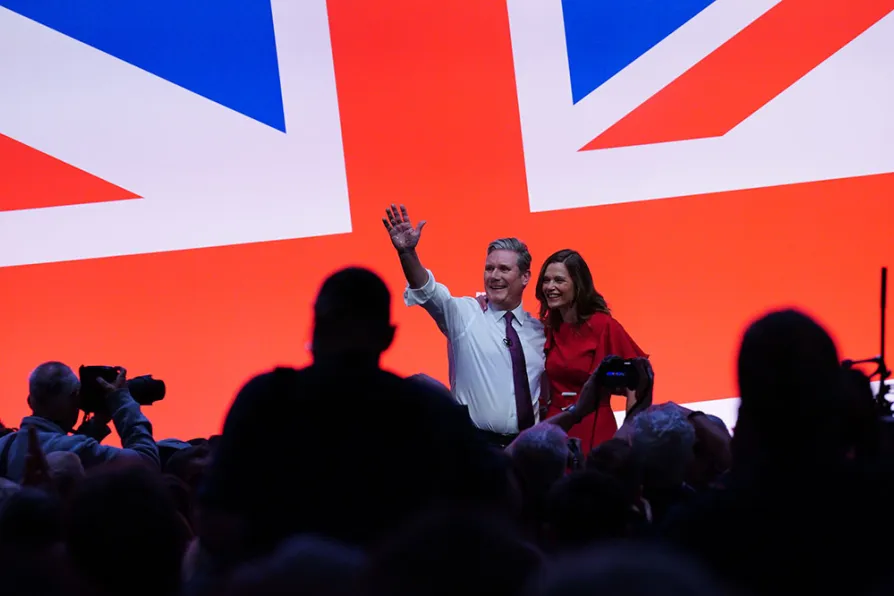CHRISTMAS 2025 is celebrated under the shadow of the hunger strikers imprisoned in British jails because of their solidarity with the Palestinian people.

 Labour leader Sir Keir Starmer making his keynote speech during the Labour Party Conference in Liverpool, October 10, 2023
Labour leader Sir Keir Starmer making his keynote speech during the Labour Party Conference in Liverpool, October 10, 2023
THE spirit of 1945 was invoked at key moments at Labour conference this week.
Keir Starmer suggested that the next Labour government would need to “rebuild” Britain as Clement Attlee’s had done. Unite leader Sharon Graham appealed for it to be as ambitious as the 1945 government was.
1945 and 1979, when Margaret Thatcher came to power, are seen as watershed elections because each marked a dramatic breach with the previous political consensus.
That we need a similar paradigm shift has become obvious since the bankers’ crash of 2007-8. The cross-party consensus around privatised services is simply not shared by the public. People want an economy that looks very different to the one we have.
But there is no sign that Labour intends to deliver this. It is true that its members and union affiliates still want it to, which is why conference this week voted for policies like energy nationalisation. But nobody expects these votes to make any difference to the party’s manifesto.
Instead the vision set out by Rachel Reeves and Starmer would leave the system mostly untouched. Thatcher’s neoliberal counter-revolution was deepened rather than arrested by the Blair government. And the creeping introduction of private-sector profiteers into the NHS that Blair pioneered will be accelerated by a Starmer administration just as it has been accelerated since Blair under the Tories: the direction of travel remains the same.
Today’s Labour politicians do not question the Thatcherite consensus on a largely privatised economy. But Thatcherism was not inevitable.
The postwar social-democratic consensus was breaking down by the 1970s, but it could have broken to the left instead of the right, with Tony Benn then pushing for economic democratisation. The “spirit of 1945” should mean challenging the assumptions of the post-1979 normal.
There is still a public appetite for radical change that the labour movement can harness if the Labour Party will not. But a truly transformative approach should look at the failings of the 1945 government as well as its successes.
Foremost among these was the squandered legacy of the people’s victory over fascism. It is true that the post-1945 order established the United Nations and new standards on the treatment of prisoners of war and refugees.
But the opportunity to break with the legacy of empire was not taken.
Britain’s postwar Labour government lined up with the United States in the cold war as a power firmly committed to upholding an imperialist world order.
Bitter resistance to movements for colonial liberation combined with a worldwide struggle against communism saw millions killed through war, coups and dictatorship over decades across three continents.
Today’s politicians are making the same choice. The rise of the global South is reshaping international relations.
Huge countries like China, India and Brazil will no longer accept global institutions operated by and for a handful of rich powers. The enthusiasm for joining the Brics group of developing nations, the refusal of most countries to abide by US and EU sanctions on Russia, the rapprochement between old enemies Saudi Arabia and Iran all reflect this new reality.
Britain has taken its stand for the old world order. It is the most zealous of Washington’s lieutenants in the new cold war. It is rearming in preparation for an era of great power confrontation, proxy wars and possible full-on world war between nuclear powers.
The most depressing aspect of Labour conference this week was the absence of any resistance to these choices. Speeches on foreign policy, militarism and belligerence went entirely unchallenged in the conference hall. It is clear that a Labour government will not deviate from the disastrous path that the Tories are taking us down.
Given the unquestionable justice of global South demands for a fairer world, and the extraordinary risk the drive to war poses to human life, the left has work to do here.

ANDREW MURRAY recommends a volume of essays that nail the visionless, racist and neoliberal character of policy under Starmer’s Labour Party

As US hegemony crumbles and Trump becomes ever more unpredictable, European powers cling to the pact’s militarist agenda in a bid to disguise their own increasing irrelevance, writes CHRIS NINEHAM












